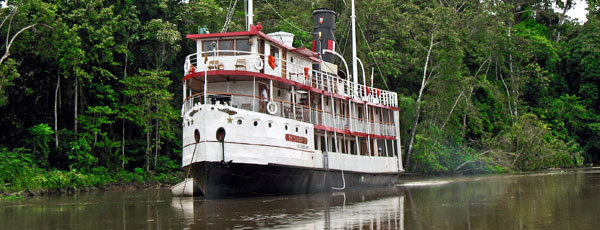Amazon Riverboat Exploration
- Iquitos, Peru
- Boats, Barges & Small Ship Cruises

| from $2,695* per person | 8 Days | November-April, June, August, September |
| Comfort accommodations | Exertion level: 3 | |
| Operator: Earthwatch Institute | 20 people max | |
Loading map, please wait...
Locations visited/nearby
earthwatch , Amazon Riverboat Exploration , Peru
0 testimonials about this trip.
1 testimonial about the provider, Earthwatch Institute:
-
Reviewer: L. Reifschneider
located in
St. Louis,
MO
USA
Elephant conservation is what drives my travel destinations. However, I always come home counting the blessings of new friends and an understanding of a culture and way of life I possibly would otherwise have never been introduced to. Through the Earthwatch projects I participate in, I am learning just how big and wonderful this world is.
Itinerary
Based on the Ayapua, a restored and remodeled vessel from the Rubber Boom era, you'll work with a team of skilled Peruvian biologists to collect information about the wildlife populations in the Pacaya-Samiria National Reserve, along the Samiria River, a major Amazon tributary.From a motorized canoe, you'll rotate tasks like conducting surveys of dolphins, fish, and river turtles. You'll also count macaws and conduct land surveys of peccaries, tapirs, deer, monkeys, and game birds. At night, you'll search for caimans with a spotlight. With expedition staff to guide you, you'll meet and talk to local people about their fishing, hunting, and conservation efforts.
In your recreational time, you can enjoy the air-conditioned library's many classic books on the Amazon, peruse the world news headlines as they are downloaded daily, check and send email, or simply relax on deck as you glide through one of the Earth's greatest wild places.
The Ayapua is a restored 33-meter, three-deck boat, with a well-stocked library, eight double cabins and one triple cabin. Each cabin is air-conditioned and has an en suite bathroom with shower. Towels and toiletries are all provided; cabins and toilets are cleaned daily and laundry (including bedding) is done every few days.
After mornings and afternoons in the field, you can head to the Ayapua's air-conditioned dining room and be treated to an array of local delicacies as well as familiar offerings like roast beef and freshly-caught fish. Mid-morning coffee and afternoon tea (and cakes), are served daily, and beverages are available on the upper deck.
220-volt electricity is available throughout the boat except between the hours of midnight and 6:00 am—though the generators are kept on during hot nights to preserve AC in the sleeping cabins. The large dining room is also used for lectures, movies, and dancing.
In addition to the Ayapua, there are many auxiliary boats (e.g. wooden and aluminum canoes) used to access the various data collection points; please see the Briefing for a more detailed description of the accommodations.
The rainforests of the Amazon basin are virtually overflowing with a diverse array of plant and animal species. You’ll share this tropical environment with beautiful birds, flowers, monkeys, and more aboard a restored riverboat you’ll call home during your expedition.
During your expedition you’ll have the opportunity to interact with indigenous people from a number of villages. The Principal Investigator and his research team have formed very positive relationships with these communities over the past 16 years. These people have always accommodated visitors with openness and friendliness.
More information from Earthwatch Institute:
- View trip on provider's website
earthwatch.org/expeditions/amazon-riverboat-exploration… - Company profile, experience, and history
- View all of their trips
- Email this trip page to a friend
-



Comments from Facebook